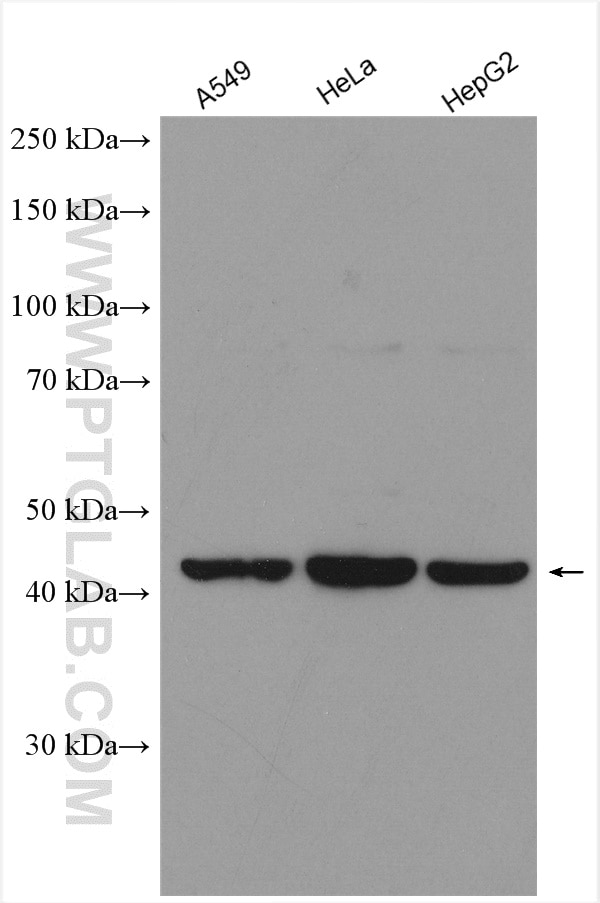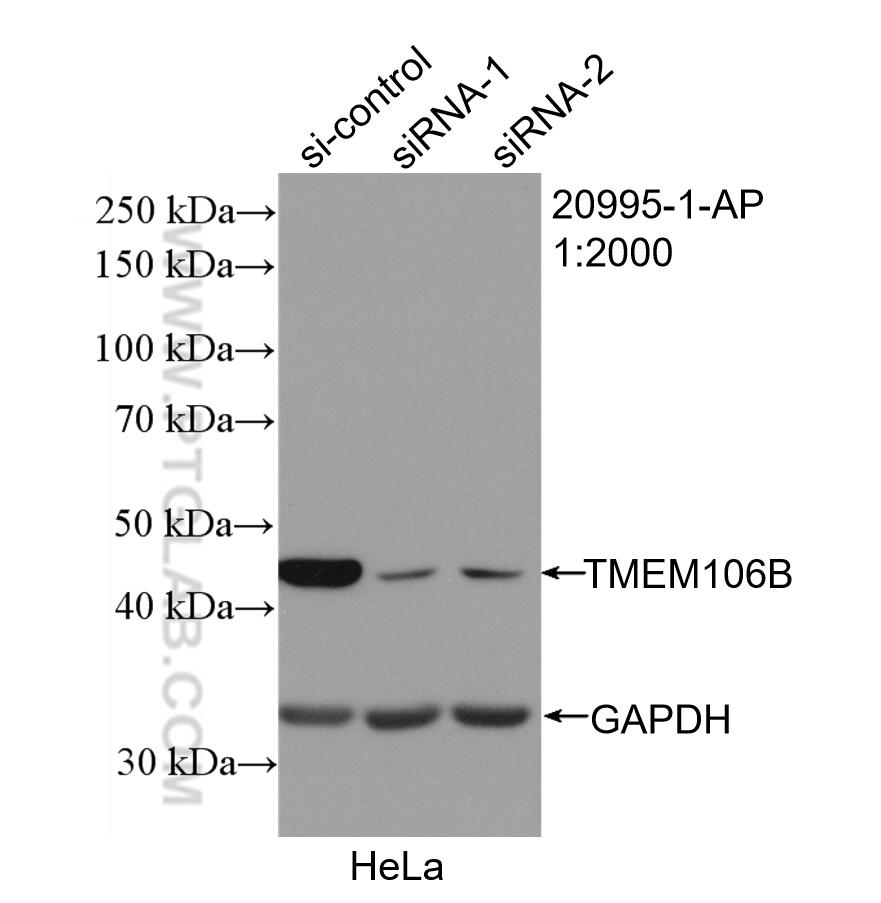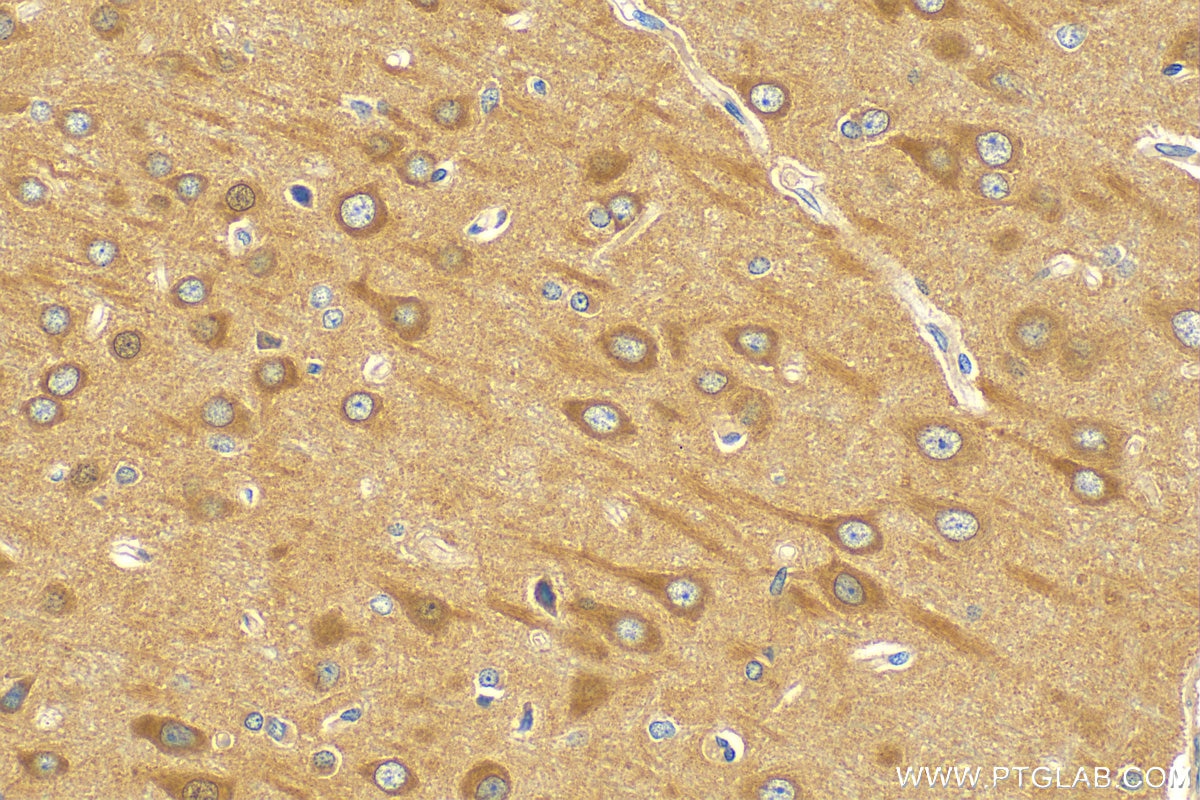Tested Applications
| Positive WB detected in | A549 cells, HeLa cells, HepG2 cells |
| Positive IHC detected in | rat brain tissue Note: suggested antigen retrieval with TE buffer pH 9.0; (*) Alternatively, antigen retrieval may be performed with citrate buffer pH 6.0 |
Recommended dilution
| Application | Dilution |
|---|---|
| Western Blot (WB) | WB : 1:500-1:2000 |
| Immunohistochemistry (IHC) | IHC : 1:50-1:500 |
| It is recommended that this reagent should be titrated in each testing system to obtain optimal results. | |
| Sample-dependent, Check data in validation data gallery. | |
Published Applications
| WB | See 7 publications below |
| IF | See 5 publications below |
Product Information
20995-1-AP targets TMEM106B (150-274aa) in WB, IHC, IF, ELISA applications and shows reactivity with human, mouse samples.
| Tested Reactivity | human, mouse |
| Cited Reactivity | human, mouse |
| Host / Isotype | Rabbit / IgG |
| Class | Polyclonal |
| Type | Antibody |
| Immunogen |
CatNo: Ag14264 Product name: Recombinant human TMEM106B protein Source: e coli.-derived, PGEX-4T Tag: GST Domain: 150-274 aa of BC033901 Sequence: LNITNNNYYSVEVENITAQVQFSKTVIGKARLNNITIIGPLDMKQIDYTVPTVIAEEMSYMYDFCTLISIKVHNIVLMMQVTVTTTYFGHSEQISQERYQYVDCGRNTTYQLGQSEYLNVLQPQQ Predict reactive species |
| Full Name | transmembrane protein 106B |
| Calculated Molecular Weight | 31 kDa |
| Observed Molecular Weight | 31-35 kDa, 40-55 kDa |
| GenBank Accession Number | BC033901 |
| Gene Symbol | TMEM106B |
| Gene ID (NCBI) | 54664 |
| RRID | AB_10694293 |
| Conjugate | Unconjugated |
| Form | Liquid |
| Purification Method | Antigen affinity purification |
| UNIPROT ID | Q9NUM4 |
| Storage Buffer | PBS with 0.02% sodium azide and 50% glycerol, pH 7.3. |
| Storage Conditions | Store at -20°C. Stable for one year after shipment. Aliquoting is unnecessary for -20oC storage. 20ul sizes contain 0.1% BSA. |
Background Information
TMEM106B is a genetic risk factor for frontotemporal lobar degeneration with TDP-43 inclusions (FTLD-TDP). Amyotrophic lateral sclerosis (ALS), like FTLD-TDP, is characterized by pathological TDP-43 inclusions. TMEM106B expression in the brain may be linked to mechanisms of disease in FTLD-TDP and risk alleles confer genetic susceptibility by increasing gene expression. TMEM106B can be showed as 31-55 kDa and 70-90 kDa (Glycosylated or Dimer) form in western blot test. (PMID: 27543298, 22895706, PMID: 23136129).
Protocols
| Product Specific Protocols | |
|---|---|
| IHC protocol for TMEM106B (150-274aa) antibody 20995-1-AP | Download protocol |
| WB protocol for TMEM106B (150-274aa) antibody 20995-1-AP | Download protocol |
| Standard Protocols | |
|---|---|
| Click here to view our Standard Protocols |
Publications
| Species | Application | Title |
|---|---|---|
J Neuroinflammation Progranulin haploinsufficiency mediates cytoplasmic TDP-43 aggregation with lysosomal abnormalities in human microglia | ||
J Neurosci TMEM106B, the risk gene for frontotemporal dementia, is regulated by the microRNA-132/212 cluster and affects progranulin pathways. | ||
Mol Brain TMEM106B, a frontotemporal lobar dementia (FTLD) modifier, associates with FTD-3-linked CHMP2B, a complex of ESCRT-III. | ||
PLoS One Construction of ceRNA network to identify the lncRNA and mRNA related to non-small cell lung cancer. |
Reviews
The reviews below have been submitted by verified Proteintech customers who received an incentive for providing their feedback.
FH Q (Verified Customer) (05-08-2025) | It seems in WB, it works better with human sample than with mouse sample.
|
FH Carolyn (Verified Customer) (02-18-2022) | good signal, low background
|










